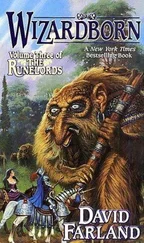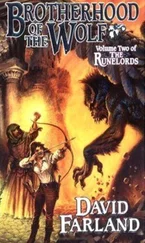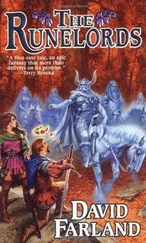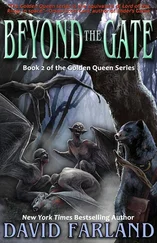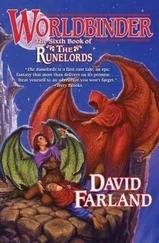Gulls and terns could be seen out perching on the debris, as if silently guarding it.
Most of the flood victims would be caught in that tangle, he imagined, and in many places the tangle was a hundred feet high, and it was hundreds of yards from shore.
He had not gone five miles when he knew that he had found some wreckage that had washed inland from Garion’s Port. He climbed a tall rocky hill and scaled a pinnacle of weathered red stone, then stood looking down for a long moment.
The blue gum forest was not particularly thick, and now it was all submerged. Trees stood in water as if they had all gone a-wading. Amid some trees he spotted a little wreckage—an old woman floating belly-up, her skin appearing as white as a wyrmling’s hide.
Not far away was a bit of an oxcart, and just beyond that floated the ox that might have been pulling it.
The woman looked naked, much as many of the folks last night had been when he searched upstream. At first Borenson had wondered if perhaps they’d all been caught bathing. But apparently the violence of the flood had a way of stripping the soggy clothes from a corpse.
He waded out into water that was chest-deep, until he reached the old woman. Then he checked her for valuables. The woman’s pants still clung to one leg, and he pulled them free. They looked too small for Myrrima, but Sage might need them. He found a ring on the woman, too—gold with a big black opal in it.
“Forgive me,” he whispered as he wrenched it from her finger. “My family has need.”
He didn’t know how much it might be worth, but he hoped that it might buy passage if he managed to hail a ship.
Then he pushed the woman back out into the waves, in the manner of his folk, giving her to the sea, and waded back to shore.
He continued south for a mile, scavenging as he went, trying to get as close to the huge mounds of wreckage as possible.
Garion’s Port had been among the largest cities in all of Landesfallen. It was a popular place for ships to take on stores. The supplies were typically packed in waterproof barrels and then sealed. Borenson hoped that a few barrels might have survived intact, but he saw nothing like that.
Upon a hill he thought he spied the hull of a ship, and so he stripped and swam out to it, nearly a mile, but it turned out to be nothing more than the curved trunk of a gum tree floating in the water. He returned to shore feeling downcast.
A few times he called out, trying to hail any survivors, but his throat was too far gone for much shouting. He saw a few floaters—mostly children and animals—and he wondered why he did not see more.
He lost hope, but kept on trudging doggedly, until the coast suddenly veered back to the east. He stopped atop a small knoll and stood for a moment, staring breathlessly out into the water, not believing his luck.
There, not three hundred yards from shore, a white ship lay amid a tangle of trees, looking as if some vast giant had just lifted it out of the sea and set it there.
It is too whole to be a wreck, Borenson thought. Someone has beached it.
“Hallooo aboard!” he cried. “Halloo in there!” He waved his arms and stood on the hill for a long moment, waiting for someone to come topside and give answer.
The wind was still, the water as calm and flat as a pond.
Perhaps they’re scavenging, he thought.
Borenson took off his armor and clothes, and then laid them on the bank. He swam through the water until he reached the pile of flotsam. He climbed up on the logs, fully expecting that at any moment someone from the ship would pop a head up and find him standing there naked.
But as he neared the ship, he called again, and no answer came.
His prize was just dancing on the water, light as a swan. The prow had beached upon some logs, but other than that, the ship looked whole. There were no sails, but that could be fixed. The Walkins had been sleeping beneath a bit of sail just up the beach.
Borenson climbed over the railing, walked around. The vessel was small indeed, no more than thirty-five feet in length.
It was a small trader by the looks of it, or perhaps a large fishing vessel, the kind used for plying the waters along the coast—not one of the big ships meant for crossing the ocean. It looked odd, for the ship was all gleaming white, reflecting the sunlight.
Borenson appraised it.
This ship is new-made! It hasn’t even been painted properly. There is only an undercoat!
He could not believe that his fortune would hold.
He climbed down belowdecks.
The ship had two cabins—one for a captain, the other for a crew of four—but Borenson found that the captain’s quarters were not made for a man of his proportions. With only a six-foot ceiling, he could not enter without crouching. He would never have fit on the slat of board that made the bed.
Much better was the hold. The entry was wide enough so that he could climb in easily. The ship had a deep belly, with a wide berth for cargo, and Borenson imagined that he and a dozen more people could make do inside.
But the vessel hadn’t escaped the flood completely free of damage. He found water seeping into the hull, and the wood was warped. The ship had been cast into a rock perhaps, or hurled into a tree.
He studied the breach. The seep was not bad, he decided. The ship had apparently been in dry dock when the flood hit, probably up on a cradle, waiting for a new coat of paint. Because it was so light, without crew or cargo, it must have floated high in the water, rising above the flood.
The interior of the vessel had been pitched, and that stopped most of the leakage, but the truth was that when any ship took its maiden voyage, it always had a few cracks. Given a couple of days the wood would swell, and most likely the hull would seal itself. If it didn’t, Borenson decided, it wouldn’t take much work to pass a few buckets of water topside each day, to drain the bilge.
When he was done inspecting, Borenson felt so moved that he dropped to his knees to thank the Powers.
I have a ship! he told himself. I have a ship!
5
A Night in the City of the Dead
The Great Wyrm provides for all your wants: meat to cure the pangs of hunger, ale to ease a troubled mind, the wine of violence in the arena to entertain. All of these are found in the city. There is no need to ever leave.
—From the Wyrmling Catechism
Crull-maldor peered down from a spy hole in the wyrmling’s citadel at the Fortress of the Northern Wastes. A band of human warriors two hundred strong had encircled her watchtower, and now they stood below, blowing battle horns, bellowing war cries, and shaking their fists at the tower as they encouraged themselves for battle.
These were small men by wyrmling standards. They were not the well bred warriors of Caer Luciare that she’d known in her world. These small folk wore armor made of seal skins, gray with white speckles, and had bright hair that was braided and slung over their backs. They bore axes and spears for battle, and carried crude wooden shields. They had dyed their faces with pig’s blood, hoping to look frightening.
Crull-maldor fought back the urge to laugh. No doubt they thought they looked fierce. Perhaps they even were fierce. But they were small, like the feral humans that had gone to war with the wyrmlings three thousand years ago.
She admired their fortitude. No doubt they had seen the giant footprints of the wyrmlings and had some inkling as to what they were up against.
But none of the wyrmlings had shown themselves. Sundown was long hours away. It was late afternoon, and the dust particles in the air dyed the world in shades of blood. The sun cut like a rapier, leaving stark shadows upon the world.
Читать дальше



